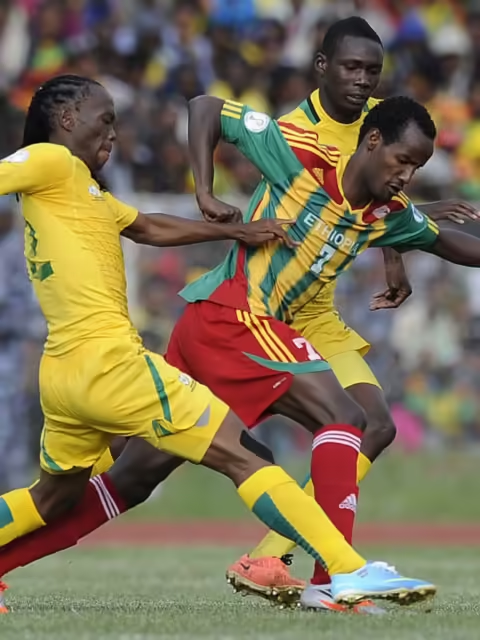by Jenny Makepeace
We stopped at a coffee farm where the beans are washed and spread out to dry on wire netting, hessian covered benches.
This area produces the coffee to supply Starbucks who not long ago were paying a pittance, recently forced to be more realistic. The roasting is done elsewhere. We tasted the coffee which is very strong – like a double espresso.
Lunch at 3pm, shared spaghetti and veg, Girma and Habtamu had a large platter of injera with lamb tibs. A beautiful tabby cat with jade green eyes finished off their unwanted lamb with great appreciation.
She isn’t used to be touched and batted my hand with razor sharp claws. This part of the Rift Valley is very lush with big trees and intensive growing of fruit and vegetables.
We drove into Awasa at 5 ish, its partially wealthy and has many big villas where the rich from Addis Ababa have weekend houses. Jacaranda trees with their lovely blossom line the streets.
Marabou storks roost in the trees and some have large fluffy white young. The hotel has a view across roofs to the lake which we found our way to down a lane strewn with litter and stinking detritus.
Obviously one of the town’s rubbish dumps, such a pity as the lake is lovely and the effluent from the rubbish is going to destroy it. A bamboo round house was under construction on the edge of the lake, a lorry unloading great piles of bamboo nearby.
The wide leaves of bamboo culms are used to line the framework, this is overlaid with woven split stems. A long concrete jetty, gently collapsing in places led to a circular end where men were fishing with simple bamboo rods. There are many water birds.
The Chambalaya Hotel is much better than most. It does not have a restaurant so we went into town to the Pinna Hotel, where we ate excellent spinach and ricotta ravioli with tomato sauce, fish and veg for John. Puddings were off, so we ate the pineapple.
A large empty fountain dominates the courtyard of the Luri hotel where we are taken for breakfast. The outside area is pleasant but service seemed to be non existent despite the presence of at least 14 staff.
Girma ordered for us, but eventually we went inside hoping for some action. It took so long that we helped ourselves from the buffet.
When the pancake I had ordered arrived at 8.15 it was the size of a wheel and as thick as a tyre and would have made an excellent plug for a working fountain, having just eaten two relatively small ones I’m afraid it was rejected.
We had arrived at 7.45 and Girma believed he had impressed upon the waiter our order for breakfast – quite simple really, tea, porridge and a pancake, mango with avocado. This at least arrived quite quickly.
These ‘smoothies’ are one of the most delicious things produced in Ethiopia. Often they are layers of all the available juices in pretty bands of colour.
The mango and avocado became a firm favorite and was generally shared as they are quite substantial. John’s tea arrived – a tiny cup of tea and an enormous cup of milk.
We visited the fish market on the edge of the lake, the catch is mainly small bass like fish, one catfish. The pelicans and marabou storks flock about waiting for handouts. Impromptu kitchens are set up under awnings.
Awasa has a lake side hotel, built by the Communists but now owned by the same owners as the Sheraton in Addis.
It’s a great location but needs a huge upgrade. Large family of ducklings here and lots of volcanic lava – some of this floats and is used to support the nets of the fishermen.
By 10.30 we were in Shashemene, the home of the Rastafarians for whom Haile Sellasie is a godlike figure. One of the reasons for this is that the Emperor went to Trinidad during a drought and as soon as he arrived it rained.
Most of the Rastas have a bad reputation here much as at home – drug users etc. Much to our surprise we arrived at the gates of a compound where a Parisian born Rasta called Alex has set up an immaculate tourist outlet with his white French wife from Nice.
They have built several local style tukuls of bamboo or mud, inside they are well appointed and pretty with excellent furniture and fittings, integral bathrooms, bedside lights, rugs and local hangings. 400 birr to 120 birr for a single.
They have 4 horses, which may be used by tourists, four nice dogs, two young children who speak fluent Amharic and go to school locally. They grow vegetables and have some lovely plants including lavender and frangipangi trees. All most impressive.
A nearby artist has won international acclaim for his work made entirely from the banana tree, from which he produced 2,000 colours cut and made into sort of collage/marquetry.
They are not our thing but clever, representing rural scenes and some religious ones with a few abstracts thrown in. Bought a card and a pot of honey.
Jenny’s article on Ethiopian journey will continue on the next piece.











